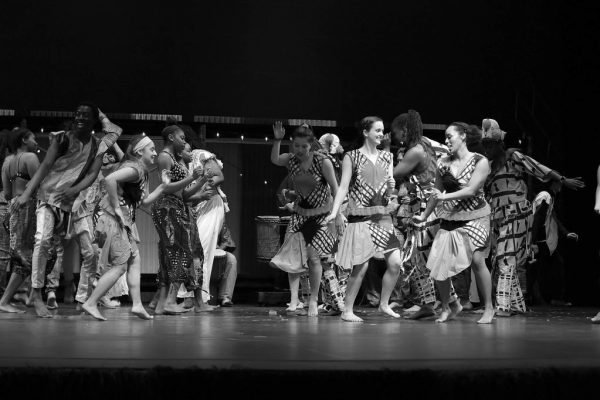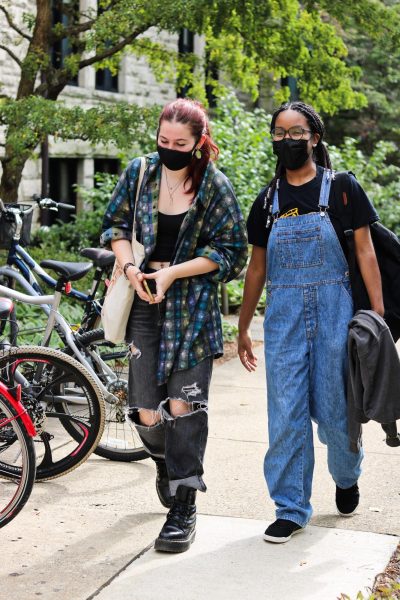We Must Uplift Iranian Student Voices
As an Iranian-American, I’ve lived my life between two worlds. My mom’s family is from Iran and speaks Farsi. My dad’s family is from a conservative town in rural northern Illinois. Living in an Irish-Catholic suburb of Chicago forced me to assimilate into a culture that didn’t fully represent my background.
Growing up, my conversations about Iran with classmates, teachers, and community members often involved them speaking about Iran with contempt and a sense of antipathy. It seemed like my family members weren’t people to them, just obstacles in their way to imperialism and control over Iran’s oil industry. As I got older, I found it easier to ignore discourse surrounding Iran because that way, I didn’t have to face reality.
When I first saw a poster for a protest against Professor Mohammad Jafar Mahallati in Wilder Hall, I felt a sense of overwhelming hope because people were speaking up for those who were wrongly killed by the Iranian government. However, a part of me wondered how many conversations on-campus actually considered the perspective of Iranians.
In the weeks leading up to the protest, I held in my anger when listening to non-Iranian students and faculty members discuss Mahallati. The conversations I heard ended with the conclusion that, because Mahallati was deemed “innocent” by the College, we must stop talking about how he covered up Ira’ís mass killing of political prisoners in 1988. I wanted to convey to them that the College’s investigation isn’t an end all, be all.
Their investigation was by no means perfect, as the College refuses to release key details such as the identity of the investigating party. It’s important that Oberlin students and faculty think for themselves, instead of just blindly following the “investigation” done by the College.
When speaking on this topic, it’s also important for non-Iranian students to acknowledge the other things Mahallati has done besides covering up the mass killing of political prisoners in 1988. These discussions left out the hate speech expressed by Mahallati throughout his career. Mahallati has been accused of not only covering up murders, but also encouraging the ostracism of Iranian Baha’is.
In the days after the Nov. 2 protest against Mahallati in Tappan Square, non-Iranian students remained ignorant. I saw one Yik Yak post asking why there were Italian flags being waved in Tappan Square. While this may have been a joke made in good faith, it proves how little some Oberlin students know about Iran and the Mahallati controversy. If this student just looked a little bit closer, they would have seen pictures of deceased sisters, fathers, children, and friends in front of the Memorial Arch.
Oberlin College students have resources available to them with information on Mahallati’s history and wrongdoings. Accusations against Professor Mahallati have been circulating since long before the fall semester started, and there is no excuse not to have read a few articles. Yet misinformation continues to circulate about Mahallati’s career before Oberlin. In one of my classes, a fellow student claimed that Mahallati was in the Central Intelligence Agency, not an ambassador to the United Nations.
This sort of misinformation is dangerous and unnecessary. It’s essential that students choosing to speak on this issue distinguish between intent and impact. Even if you intend to educate others and raise awareness about Mahallati, spreading false narratives about Mahallati distracts from his malicious actions.
To non-Iranian Oberlin College students and faculty, I am not asking for any of you to memorize every fact about the Mahallati controversy and bring it up in discussion. But even if you feel like you have done your research, you should be wary of speaking with authority, especially if you haven’t spoken with the Iranians most affected by this issue.
I am also asking that if you know someone who is Iranian, consider checking in with them. If they’re open to discussion, see what their thoughts are on this issue. Our voices can speak to lived experiences, as opposed to listening exclusively to non-Iranians who might not truly understand this issue.
Professor Mahallati is a product of the system that serves to tear us apart. As always, we need to come together against such discrimination. If you know Iranian and other Middle Eastern and North African students, recognize that they are individuals. Don’t project your negative feelings about their governments — or your half-researched opinions about Mahallati — onto them.




